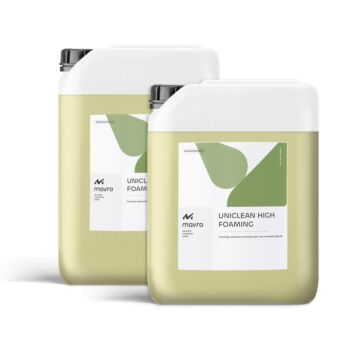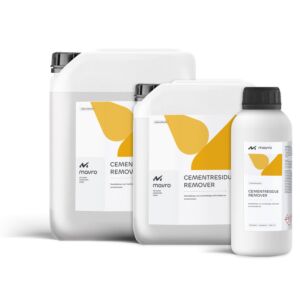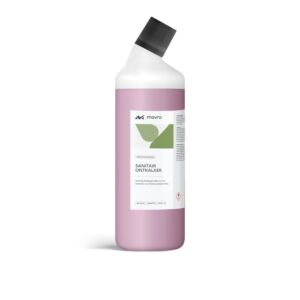Lime Remover Limescale remover
Effective solvent for limestone, carbonates and contaminants caused by residues of ‘’hard’’ water, salt efflorescence on floors and tilling. This limescale remover can be used on various mineral substrates like tiles and other types of floors; various types of masonry and even glass.
PRODUCT DESCRIPTION
Lime Remover is an acidic limescale remover based on hydrochloric acid for the removal of limescale, carbonates and contaminants caused by salt and soot deposits.
USE
Lime Remover limescale remover is suitable for cleaning acid-resistant surfaces such as masonry, tiles, floors and glass.
CHARACTERISTICS
• Efficient, fast cleaning
• Is friendly on most surfaces
• Can be used as a saline solution on concrete
PACKAGING
1, 5 and 10 L.
OPERATING INSTRUCTIONS
1. Apply Lime Remover undiluted with a brush.
Pour the product on horizontal parts and spread with a brush or broom.
2. Allow the product to work on the surface for 5-10 minutes. Keep the surface moist during the application time.
3. Rinse and clean the surface with a high-pressure cleaner. Depending on the surface, use a pressure between 50 and 200 bar. Use cold or warm water with a maximum temperature of 50 ° C.
4. Repeat the procedure if necessary.
APPLICATION CONDITIONS
Lime Remover can be used in all dry weather conditions.
CONSUMPTION
Consumption is 3-5 m2/L depending on nature and degree of the contamination and the porosity of the surface.
STORAGE AND STABILTY
Can be stored in original unopened packaging for at least 24 months. Store in a dry, well ventilated cool and frost-free place.
SAFETY PRECAUTIONS
Causes severe burns and eye damage. Avoid skin and eye contact, wear suitable gloves, protective clothing and safety goggles. When in doubt, always consult the safety data sheet or our R&D department.
-
Icon
-
Icon
Support
Our advisors are happy to help you
-
Icon
Pay later!
Afterwards pay possible!
-
Icon








